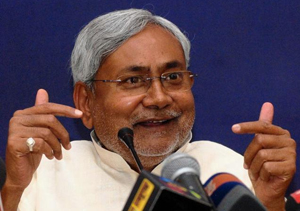
Patna, Jun 16: Bihar chief minister Nitish Kumar will seek a vote of confidence on the floor of state assembly on June 19.
Speaking to reporters after meeting Bihar governor DY Patil, Nitish Kumar said the cabinet has decided to call a special session of Bihar assembly to prove the government's majority.
According to Times Now, Nitish Kumar, who met the governor on Sunday afternoon, informed him that his party's alliance with the BJP in the state was over.
Nitish apprised the governor of the political situation in the state and sought permission for a floor test.
Nitish Kumar is likely to sack all the BJP ministers, according to Times Now.
Earlier, the JD(U) held a crucial meeting Nitish Kumar's residence here to discuss on the decision to sever ties with BJP.
The party passed a strongly-worded resolution detailing the reasons behind its decision to end the 17-year-old alliance with the BJP in Bihar.
The meeting was attended by JD(U) president Sharad Yadav, who interacted with party MPs, ministers, legislators and other party leaders.
JD(U) general secretary KC Tyagi told reporters that there was no scope left for continuing in NDA after the alliance party gave a clear signal of choosing Narendra Modi as its prime ministerial candidate.
Earlier, Nitish Kumar held an emergency cabinet meeting at his residence without BJP ministers. The 11 BJP ministers, including deputy chief minister Sushil Kumar Modi, did not attend the cabinet meeting saying it was "meaningless".
"What is the need for convening the cabinet meeting by the chief minister as all indications suggest that JD(U) has decided to split with the BJP-led NDA?" Bihar unit BJP president Mangal Pandey told reporters.






Comments
Add new comment